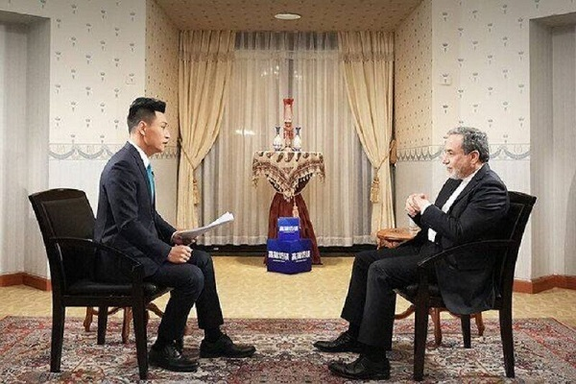Iran’s FM says diplomacy moves in tandem with the battlefield

Iranian Foreign Minister Abbas Araghchi has said that diplomacy and battlefield strategies must align as Tehran seeks to maintain its military power despite significant regional setbacks.

Iranian Foreign Minister Abbas Araghchi has said that diplomacy and battlefield strategies must align as Tehran seeks to maintain its military power despite significant regional setbacks.
“Diplomacy moves in tandem with the battlefield, complementing each other,” Araghchi said. “The battlefield paves the way for diplomacy, and diplomacy turns the achievements of the battlefield into national security, national interests, national pride, and national dignity.”
Referring to Iran’s approach as the “diplomacy of resistance,” he insisted that military and diplomatic efforts must move forward together to secure the country’s objectives.
Araqchi, without mentioning the developments in Syria and the fall of Bashar al-Assad, said: "The enemies think that if they inflict damage on the Axis of Resistance, it will be a victory for them. They must know that this marks the beginning of their defeat."
According to Iran’s Foreign Minister, "What has transpired over the past few months for the region, the Resistance, and Iran was a renewed manifestation of the complete coordination between the field and diplomacy."
The Islamic Republic’s officials’ reference to the battlefield and the Axis of Resistance pertains to the presence of Iran’s proxy forces in Iraq, Syria, Lebanon, and Yemen.
Araghchi expanded on these themes during his recent interview with China’s state-run CCTV, aired Saturday. Addressing the prospect of further Israeli strikes on Iranian targets, he struck a defiant tone.
“We are fully prepared for the possibility of further Israeli attacks,” he said. “I hope Israel will refrain from taking such reckless action, as it could lead to a large-scale war.”
Amid speculation that Israel may escalate its response to ballistic missile and drone attacks by Iran's allies, Araghchi cautioned against the potential consequences of such actions. However, he underscored Iran’s preference for diplomacy, highlighting the importance of reason in preventing conflict. “We believe that reason will ultimately prevail and prevent actions that could have serious consequences,” he told the broadcaster.
The interview, conducted during Araghchi’s late-December visit to Beijing, also highlighted Iran’s efforts to strengthen ties with China. Araghchi discussed regional security and the nuclear deal, reaffirming Tehran’s interest in fostering international alliances to counter US sanctions and Israeli military actions.
Araghchi’s remarks come amid increasing geopolitical and economic pressures on Iran. Israeli airstrikes have repeatedly targeted Iranian-backed forces in Syria, while ballistic missile and drone attacks by Yemen’s Houthi rebels—armed by Tehran—have added to regional instability.
At the same time, Iran faces internal criticism over its setbacks in Syria and the broader region.
It seems Iran’s rhetoric of resistance aims to project strength even as its regional position has weakened. By tying military successes to diplomatic gains, Tehran seeks to sustain its influence in Syria and counter perceptions of weakness.
Araghchi’s remarks also reflect Iran’s broader narrative of perseverance. Whether through alliances with powers like China or the fusion of battlefield and diplomatic strategies, Tehran appears determined to adapt to shifting regional dynamics without conceding defeat.